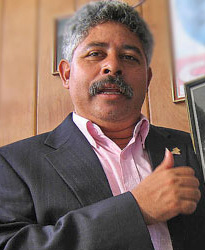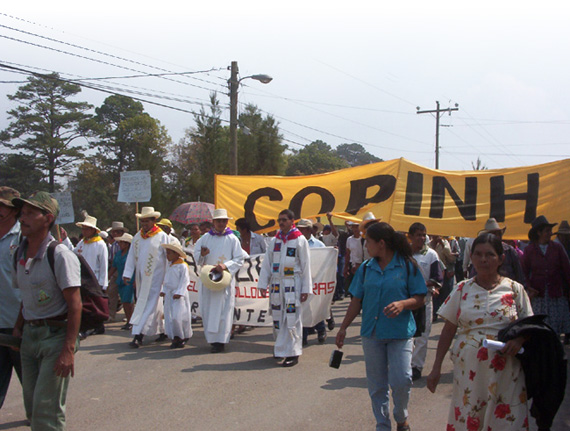|
In March 2007,
the Nicaraguan-based Pellas Group announced that it planned to invest 150
million dollars in the construction of the first sugar mill and ethanol
distillery in the Department of Olancho, Honduras.1
The goal of the
Group is to significantly increase the volume of ethanol it produces and exports
to Europe from Nicaragua, and to begin supplying the US market and
Honduras itself, where in November 2007, the National Congress passed the
Biofuels Production and Consumption Act, creating –according to the Honduran
newspaper El Heraldo- “the institutional and regulatory framework and the
incentives necessary to promote national production and large scale use of
biofuels such as biodiesel and ethanol, within the short term. This provision
makes Honduras the first country in the region to have a specific law on
biofuels.”2
However, the
legislative work is still unfinished, as the Regulation for this law, which will
be the instrument through which it will be implemented, is still to be approved.
|

Carlos Pellas Chamorro |
According to
statements by Carlos Pellas Chamorro, president of the Pellas Group,
to El Heraldo3,
Ingenio San Antonio, a sugar mill owned by the company Nicaragua Sugar
Estates Ltd. (NSEL)4,
which is also part of the Pellas Group, is the leading ethanol exporting
company of Central America. Last year it exported some 17 million liters,
and for this year it expects to export a total of 40 million liters.
Ingenio San
Antonio has an installed ethanol production capacity of 100 thousand liters/day,
and a project is currently underway to build a second distillery, with a
capacity for 300 thousand liters/day..
The Pellas Group project is
apparently enjoying the favors of the government of president Manuel Zelaya.
Even Agriculture and Livestock Secretary Héctor Hernández himself confirmed that
the project would expand over a total of 15 thousand hectares and would create
20 thousand jobs.
However, some
sectors of the population are increasingly concerned over the use of huge
expanses of land to grow sugarcane, especially when the country is going through
such a critical time as this, as Honduras faces rising food costs,
conflicts over land ownership, and lack of food sovereignty and security.
|

Marvin Ponce |
According to
Marvin Ponce, congressman for the Democratic Unification Party (UD),
“the Pellas Group has been pushing for some years now to build an
ethanol production plant in the Olancho area, one of the most important
regions in terms of food production. Three valleys in this department account
for a large part of bean, corn, rice and vegetable production, and have a
significant cattle-raising activity.”
Alarmed Voices
What the
Pellas Group is trying to do, Ponce continued, “is to buy
approximately 70 thousand hectares of land in the departments of Olancho,
El Paraíso, and Yoro to plant sugarcane. It is a foreign
investment project that worries us greatly, because it would entail dismantling
an area where almost 75 percent of the country’s basic grain is grown, to
convert it to agrofuel production. While it is true that it’s necessary to
invest in the country’s development, this measure would have a terrible effect
on peasant agriculture. We must also take into account that Honduras has
a high deficit in food production and must import food to cover domestic demand.
This foreign investment would aggravate that deficit, with very negative effects
for Olancho, where 45 percent of the population lives under the poverty
line.”
For the
Honduran legislator, the negative effects of the ethanol production project
would also extend to the rest of the country. “If some 35 thousand hectares
of land are turned over to sugarcane production, and away from food crops, that
would reduce our basic grain production by about 140 thousand tons a year,”
Ponce said.
Despite the
efforts made to date by the Pellas Group, the Nicaraguan giant has found
it hard to buy enough land to get its ambitious project up and running.
“One of the
effects it has had in the Olancho region is a steep rise in land prices.
A block of land [0.7 hectare] used to be worth around 1,200 dollars, but with
the arrival of the Pellas Group and the increase in demand, the price has
shot up to 4,000 dollars. Another factor that is making it difficult for it to
purchase land -Ponce explained- has to do with legal conflicts. There are
many peasants or communities that hold land but are indebted with the banks and
who would have to free their mortgages in order to be able to sell their lands.
This is further complicated by cultural factors, as the population is deeply
rooted in the area. There is a third factor that involves large landowners in
particular, many of whom refuse to sell, because in Honduras having land
means having economic and political power, and they are not willing to give that
up.”.
According to
congressman Ponce, the Pellas Group has already purchased
some 5 thousand hectares in Olancho and it is possible that it may try to
move to other departments, such as, for example, Yoro, where it could
find more favorable conditions, as well as securing the support of some
important intermediaries.
“The government
of Honduras has not yet defined its position on the implementation of
agrofuel production, nor does it have a strategic plan for it. Rather, it has
a different speech depending on who’s listening: on the one hand, it claims to
support food production, and on the other, it says it backs agrofuel production,
with African oil palm and physic nut crops for biodiesel, and sugarcane for
ethanol. In this sense, the Pellas Group has the support of
one of Nicaragua’s leading businessmen, Piero Cohen Montealegre, who is
currently that country’s ambassador to Honduras, and whose
relationship with President Zelaya is so close that he loans him his
helicopter and private jet for official trips. Piero Cohen is the great
negotiator that the Pellas Group has in Honduras,” Ponce
said to Sirel.
The land problem
In addition to
the issue of the threat posed to food production and the impact that the
Pellas Group project will have on the country’s food security, there
is another great problem, and that is land holding, as peasant and civil society
organizations are calling for an integral agrarian reform.
“The land
market has shot up, and our position is that, faced with this food crisis and
with over 300 thousand landless peasant families, the country must implement a
new agrarian reform through two strategies -Ponce pointed out.- The first
strategy would be to solve the land conflicts that have existed for more than 30
years; 45 thousand hectares of land that are held by peasants without their
having received the corresponding land titles. We ask that Congress -Ponce
continued- issue a legislative decree to solve all of these land conflicts.
A decree ordering that
all the public and
private lands that are currently being held by peasant, indigenous and
Afro-Honduran families be immediately expropriated and granted to their
occupants, with titles issued in their names. At the same time, the Courts of
Justice must abstain from prosecuting any eviction demands and criminal actions
filed against these peasant groups.”
The second
strategy has to do with the new Integral Agrarian Reform Act. According to
Juan Vásquez, of the Executive Committee of the Civic Council of Popular and
Indigenous Organizations of Honduras (COPINH), “The indigenous
communities are calling for an integral agrarian reform that will grant the
indigenous and peasant populations community ownership titles over the land. We
don’t want the State to purchase the land so it will then sell it to us, but
rather the reform should involve a process of land recovery based on our
people’s ancestral ownership rights. We also ask for effective support for
production and sustainable agriculture. For us -Vásquez continued-, the
bond with our Mother Earth runs very deep. The land is sacred, we must care for
it and respect it, and we know that these agrofuel production projects involve
the use of agrochemicals that contaminate the waters and the soil and have
adverse effects on the environment and on human health, and entail the felling
of our forests.
In addition to affecting
food production, the massive growing of crops for agrofuel production would
truly put our populations at risk,”
Vásquez noted.
In Nicaragua,
the Nicaraguan Association of People Affected by Chronic Renal Failure (ANAIRC),
an IUF affiliate, has accused Ingenio San Antonio on several occasions of
being responsible for the thousands of former sugar workers affected by CRF.
According to the ANAIRC, an estimated 2,700 former workers have died and
over 7 thousand more have been affected by the indiscriminate use of
agrochemicals in sugarcane plantations, which have even contaminated water
resources. Various studies have confirmed a direct connection between exposure
to agrochemicals and various diseases, including Chronic Renal Failure.
The Executive
Committee of the COPINH recalled that “just like they did with the
maquiladoras in Honduras, they always tell us that these projects will
generate jobs, but the truth is that these ventures are managed by large
corporations, and only the rich will benefit from them. We are also greatly
concerned over the rise in the cost of the basic market basket, which is why we
are conducting protest and resistance actions that include battling the
country’s corruption,” Vásquez pointed out.
Last April
17, more than 100 thousand Hondurans marched through
the streets all over the country in a National Civic Strike, to pressure the
government into taking concrete action in response to a package of a dozen
demands,
including halting the
rise in the cost of basic goods through a strict control on prices, a general
increase in wages, the implementation of an integral agrarian reform, granting
peasants access to land and credits, and guaranteeing food sovereignty for the
Honduran people, supplying basic grains for the entire country.
The Pellas Group
The Pellas
Group is a conglomerate of more than 50 companies, which has been headed by
Carlos Pellas Chamorro since the early 1980s. Its assets are valued at 4
billion dollars, and it employs approximately 15 thousand workers.
According to
the magazine Revista Summa5,
the most important companies in the Pellas Group include banking
operators such as BAC International Bank, a company present in every
Central American country, which also controls the Credomatic network,
and BAC Florida Bank, in the south of Florida (United States). In
2005, the Pellas Group entered into negotiations with GE Consumer
Finance, the financial division of the powerful multinational corporation
General Electric, for the sale of 49.99 percent of the stock of BAC
International Bank, the leading credit card operator in the Isthmus. Some of
the other companies owned by the Pellas Group include Nicaragua
Sugar Estates Limited, owner of the agro-energy complex “Ingenio San
Antonio,” with an annual production capacity of 250 thousand metric tons of
sugar, 18 million liters of ethanol, 80 thousand metric tons of molasses and 60
MW of power, besides having several diversification projects underway, like
shrimp production and power generation through the planting of 5,500 blocks of
eucalyptus. Also owned by the group is Compañía Licorera de Nicaragua SA,
the company that produces the Flor de Caña rum, other alcoholic
beverages, and methane gas.
Another of the group’s companies is Casa Pellas, which has the
representation of Toyota in Nicaragua.
The Pellas
Group is a conglomerate of more than 50 companies, which has been headed by
Carlos Pellas Chamorro since the early 1980s. Its assets are valued at 4
billion dollars, and it employs approximately 15 thousand workers.
According to
the magazine Revista Summa5,
the most important companies in the Pellas Group include banking
operators such as BAC International Bank, a company present in every
Central American country, which also controls the Credomatic network,
and BAC Florida Bank, in the south of Florida (United States). In
2005, the Pellas Group entered into negotiations with GE Consumer
Finance, the financial division of the powerful multinational corporation
General Electric, for the sale of 49.99 percent of the stock of BAC
International Bank, the leading credit card operator in the Isthmus. Some of
the other companies owned by the Pellas Group include Nicaragua
Sugar Estates Limited, owner of the agro-energy complex “Ingenio San
Antonio,” with an annual production capacity of 250 thousand metric tons of
sugar, 18 million liters of ethanol, 80 thousand metric tons of molasses and 60
MW of power, besides having several diversification projects underway, like
shrimp production and power generation through the planting of 5,500 blocks of
eucalyptus. Also owned by the group is Compañía Licorera de Nicaragua SA,
the company that produces the Flor de Caña rum, other alcoholic
beverages, and methane gas.
Another of the group’s companies is
Casa Pellas, which has the representation of Toyota in
Nicaragua.
 |